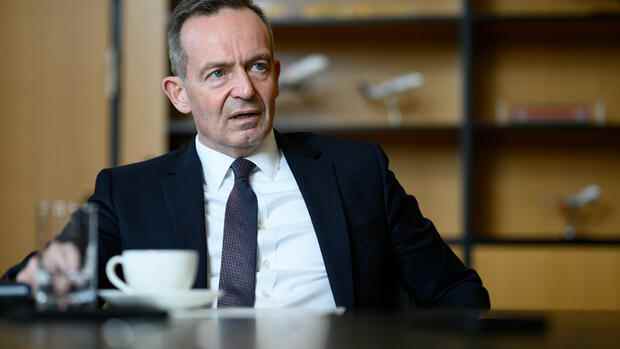A dispute has already broken out behind the scenes about which transport projects the coalition will forgo in the next few years
(Photo: dpa)
Berlin The rising construction costs are now also a burden on the federal government’s largest investment budget. This is the result of an updated cost estimate by the Federal Ministry of Transport for all transport projects that the federal government wants to build by 2030.
The report for the budget committee, which is available to the Handelsblatt, specifically states: “Due to more detailed planning and significant increases in construction costs”, the federal government will have to invest 65 billion euros more than planned if it wants to implement all projects.
According to the report, the “construction cost development between 2016 and 2021 according to the weighted index ‘Federal Highway Construction’ is around 24.7 percent”. According to the budget politician Frank Schäffler (FDP), there is an increase of 14.3 percent (plus 20 billion euros) for the railways and even 65 percent (plus 5.1 billion euros) for the waterways. 40.4 billion euros more would be needed for the roads.
Not included are the price jumps that occurred this year, mainly because of the Ukraine war. According to the Central Association of the German Construction Industry, building materials cost between 12.1 percent (gravel and sand) and 69.9 percent (bitumen) more in June 2022 than in the previous year. According to the Federal Statistical Office, road construction alone rose by a further 13.7 percent in the first half of the year.
Top jobs of the day
Find the best jobs now and
be notified by email.
Accordingly, the costs should now be significantly higher than the 65 billion euros. And there is no end in sight: The building materials trade is informing construction companies these days that they will raise prices again in view of the gas levy due from October 1st.
>> Also read here: Complaints about the railway are increasing drastically – politicians are demanding consequences
Federal Transport Minister Volker Wissing (FDP) does not receive more money than in the previous year to invest in transport routes. Accordingly, the dispute is already beginning behind the scenes as to which projects the coalition will forego in the next few years. “We have to be honest,” said the coalition.
What makes sense and what doesn’t, however, can be argued about. In view of the cost increases, many rail projects will no longer be worthwhile. “The traditional benefit-cost calculation can no longer apply to rail,” said SPD parliamentary group leader Detlef Müller. “Rail projects make sense per se because they help to save carbon dioxide. This is especially true for the electrification of railway lines.”
FDP housekeeper Schäffler, meanwhile, is a thorn in the side of a railway project in his own constituency. For example, the Hanover-Bielefeld railway line is to become a high-speed line in order to reduce travel time by 31 minutes. According to the current status, the project alone would cost 8.4 billion euros. “We can’t realize every rapid transit line,” he has already announced. A “cash drop” and “more realism” are needed.
The route is part of the “Deutschlandtakt” concept. According to this, the transfer times from one train to another at central stations should not take longer than half an hour and thus ensure that more people travel by train. However, this could also be realized with slower trains.
Opposition demands to implement all projects
“Additional costs in the requirements plans of 65 billion euros must focus on upgrading the infrastructure and put expensive new construction projects – for example at the Deutschlandtakt – to the test,” said Schäffler. “In particular, the current inflationary trend in primary products and in construction has not yet been taken into account.”
>> Also read here: Infrastructure: Germany needs a modernization plan
“The sometimes rapid increases in construction costs make it clear that we have to talk about priorities in the transport budget that are essential for the success of the mobility turnaround,” said the Green Housekeeper Paula Piechotta. “That means quite clearly: significantly more money for the rail than for the road and maintenance before new construction.”
Accordingly, she welcomed the fact that the coalition had agreed to invest a further 1.5 billion euros in “low-CO2 mobility” with the new relief package. “As a parliament, we will use these funds responsibly.”
The traffic policy spokesman for the CDU/CSU parliamentary group criticized the coalition debate. “All measures of the Federal Transport Infrastructure Plan were selected in a complex process based on clear criteria. It’s not a wish list, it’s a transport policy necessity,” said Thomas Bareiß. “That’s why we are now expecting measures and a timetable on how the plan will be implemented – despite the difficult framework conditions. As road traffic accounts for an ever-increasing share of the federal budget due to fuel taxation and truck tolls, the citizens are finally expecting some commitment from Minister Wissing.”
More: The economy is looking for a connection to the rails – but bureaucracy and network problems stand in the way
